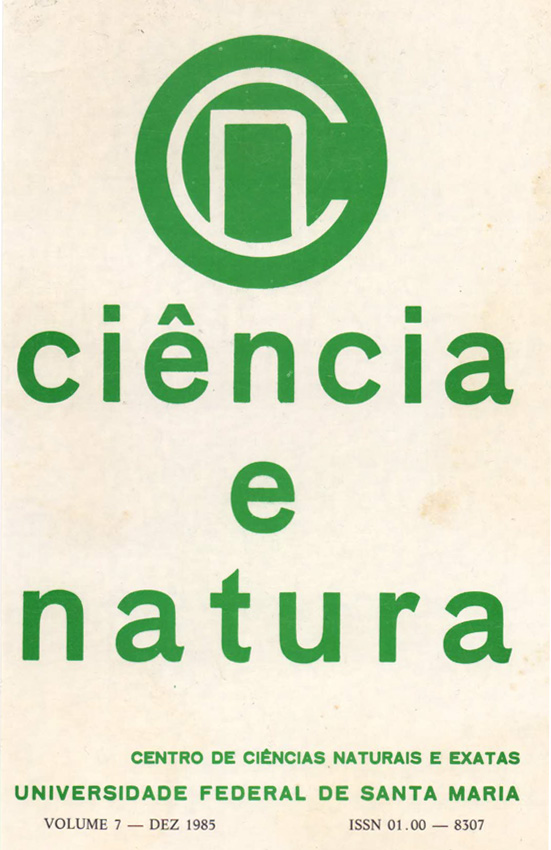Calibração do Long Counter de De Pangher com o padrão secundário destinado a calibração de monitores de nêutrons com moderadores
DOI:
https://doi.org/10.5902/2179460X25403Resumo
O presente trabalho visa fundamentalmente a calibração do Long Counter de De Pangher, utilizado como padrão secundário, destinado a calibração de monitores de nêutrons com moderadores. Empregou-se como padrão primário uma fonte de Am-Be de 5 Ci padronizada, em relação a taxa de emissão de nêutrons, pelo método de ativação de um banho de sulfato de manganês. Devido ao formato cilíndrico da fonte padrão, determinou- se seu fator de anisotropia. Foram efetuados testes de reprodutibilidade do Long Counter e determinou-se experimentalmente, pelo método do cone de sombra, os efeitos de espalhamento no ambiente.
Downloads
Referências
SCHUCH, L.A., Calibração de Monitores de Neutrons com Moderadores e Aplicação na Determinação de Fatores de Calibração de Dosimetros de Albedo, Tese de Mestrado, IME, Rio de Janeiro (1979).
NACHTIGALL, D., BURGER, G., Dose Equivalent Determinations in Neutron Fields by Means of Moderator Techniques, Topics in Radiation Dosimetry, Academic Press (1972).
DE PANGHER, J., NICHOLS, L.L., A Precision Long Counter for Measuring Fast Neutron Flux Density, BNWL-260, Washington (1966).
HAJNAL, F., McLAUGHLlN, J.E., OECHSLER, R., Technique for Determining Moderated Neutron Instrument Characteristics, HASL 222, New York (1970).
MIJNHEER, B.J., Standard Fluxes and Standard Moderating Counters for Neutron Fluence Measurements, Thesis, Amsterdam (1971).
HUNT, J.B., ROBERTSON, J.C., The Long Counter as a Secondary Standard for Neutron Flux Density, Proc. First Symp. on Neut. Dosim. In Biol. and Med., EUR 4896 (1972).
MASSAND, O.P., Investigation of Some Properties of the Precision Long Counter, EURATOM-Rep. (1972).
SCRAUBE, A., GRUNAUER, F., BURGER, G., Calibration Problems With Neutron Moderator Detectors, Proc. Neut. Monit. for Rad. Prot. Purposes, II, IAEA (1973).
THOMPSON, I.M.G., LAVENDER, A., Calibration of the De Pangher Long Counter, Proc. Neut. Monit. for Rad. Prot. Purposes, II, IAEA (1973).
LINDENBAUM, S.J., Conf. on Shielding of High-Energy Accelerators, TID-7545, New York (1957).
DE PANGHER, J., A Reproducible Precision Polythene Long Counter for Measuring Fast Neutron Flux, Rep. Hanford Lab., Richland, Washington (1961).
MARSHALL, T.O., Some Tests on the Consistency of the Performance of Six Precision Long Counters Intended as Secondary Standards for the Measurement of Fast Neutron Flux Density, Health Phisics, 18, (1979).
REINERT DE LIMA, C.A., PAJMQ - Programa para Ajustamento Automático por Mínimos Quadrados, IME.
Downloads
Publicado
Como Citar
Edição
Seção
Licença
Para acessar a DECLARAÇÃO DE ORIGINALIDADE E EXCLUSIVIDADE E CESSÃO DE DIREITOS AUTORAIS clique aqui.
Diretrizes Éticas para Publicação de Revistas
A revista Ciência e Natura está empenhada em garantir a ética na publicação e na qualidade dos artigos.
A conformidade com padrões de comportamento ético é, portanto, esperada de todas as partes envolvidas: Autores, Editores e Revisores.
Em particular,
Autores: Os Autores devem apresentar uma discussão objetiva sobre a importância do trabalho de pesquisa, bem como detalhes e referências suficientes para permitir que outros reproduzam as experiências. Declarações fraudulentas ou intencionalmente incorretas constituem comportamento antiético e são inaceitáveis. Artigos de Revisão também devem ser objetivos, abrangentes e relatos precisos do estado da arte. Os Autores devem assegurar que seu trabalho é uma obra totalmente original, e se o trabalho e / ou palavras de outros têm sido utilizadas, isso tem sido devidamente reconhecido. O plágio em todas as suas formas constitui um comportamento publicitário não ético e é inaceitável. Submeter o mesmo manuscrito a mais de um jornal simultaneamente constitui um comportamento publicitário não ético e é inaceitável. Os Autores não devem submeter artigos que descrevam essencialmente a mesma pesquisa a mais de uma revista. O Autor correspondente deve garantir que haja um consenso total de todos os Co-autores na aprovação da versão final do artigo e sua submissão para publicação.
Editores: Os Editores devem avaliar manuscritos exclusivamente com base no seu mérito acadêmico. Um Editor não deve usar informações não publicadas na própria pesquisa do Editor sem o consentimento expresso por escrito do Autor. Os Editores devem tomar medidas de resposta razoável quando tiverem sido apresentadas queixas éticas relativas a um manuscrito submetido ou publicado.
Revisores: Todos os manuscritos recebidos para revisão devem ser tratados como documentos confidenciais. As informações ou ideias privilegiadas obtidas através da análise por pares devem ser mantidas confidenciais e não utilizadas para vantagens pessoais. As revisões devem ser conduzidas objetivamente e as observações devem ser formuladas claramente com argumentos de apoio, de modo que os Autores possam usá-los para melhorar o artigo. Qualquer Revisor selecionado que se sinta desqualificado para rever a pesquisa relatada em um manuscrito ou sabe que sua rápida revisão será impossível deve notificar o Editor e desculpar-se do processo de revisão. Os Revisores não devem considerar manuscritos nos quais tenham conflitos de interesse resultantes de relacionamentos ou conexões competitivas, colaborativas ou outras conexões com qualquer dos autores, empresas ou instituições conectadas aos documentos.






